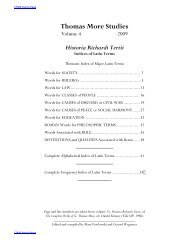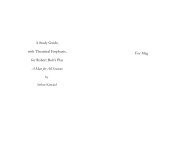life of john picus earl of mirandola - The Center for Thomas More ...
life of john picus earl of mirandola - The Center for Thomas More ...
life of john picus earl of mirandola - The Center for Thomas More ...
Create successful ePaper yourself
Turn your PDF publications into a flip-book with our unique Google optimized e-Paper software.
[69]<br />
Talk proceeding <strong>of</strong> an<br />
earnest zeal worketh<br />
effectually.<br />
Similitude <strong>of</strong> manners<br />
causeth love<br />
Proud palaces<br />
Liberty<br />
[70]<br />
Observances<br />
20 <strong>Thomas</strong> <strong>More</strong>’s Life <strong>of</strong> John Picus<br />
a ⌐ cunning ¬ man ⌐ (but not so good as cunning) came to him on a<br />
day ¬ <strong>for</strong> the great fame <strong>of</strong> his learning to commune with him, as they<br />
fell in talking <strong>of</strong> virtue he was with two words <strong>of</strong> Picus so throughly<br />
pierced that <strong>for</strong>thwithal he <strong>for</strong>sook his accustomed vice and re<strong>for</strong>med<br />
his conditions. <strong>The</strong> words that he said unto him were these: “If we<br />
had evermore be<strong>for</strong>e our eyes the ⌐ painful ¬ death <strong>of</strong> Christ which He<br />
suffered <strong>for</strong> the love <strong>of</strong> us, and then if we would again think upon<br />
our death, we should well beware <strong>of</strong> sin.” Marvellous be nignity and<br />
courtesy he showed unto them, not whom strength <strong>of</strong> body or goods<br />
<strong>of</strong> <strong>for</strong>tune magnified, but to them whom learning and condition bound<br />
him to favour. For similitude <strong>of</strong> manners is a cause <strong>of</strong> love and friendship:¦<br />
a likeness <strong>of</strong> conditions¦ is (as Appollonius 1 saith¦) an affinity.¦<br />
⌐ What he Hated and what he Loved. ¬ <strong>The</strong>re was nothing more odious<br />
nor more intolerable to him than (as Horace 2 saith) the proud palaces<br />
<strong>of</strong> stately lords. Wedding and worldly business he fled almost alike.<br />
Notwithstanding, when he was asked once in sport whether <strong>of</strong> those<br />
two burdens seemed lighter and which he would choose if he should<br />
<strong>of</strong> necessity be driven to that one, and at his election; which he sticked<br />
thereat 3 a while, but at the last he shook his head and a little smiling he<br />
answered that he had leuer take him to marriage, as that thing in which<br />
was less servitude and not so much jeopardy. Liberty above all things<br />
he loved, to which both his own natural affection and the study <strong>of</strong><br />
philosophy inclined him¦; and <strong>for</strong> that he was always wandering and<br />
flitting and would never take himself to any certain dwelling.¦<br />
⌐ Of his Fervent Love to God. ¬ Of outward observances he gave no<br />
very great <strong>for</strong>ce: we speak not <strong>of</strong> those observances which the Church<br />
commandeth to be observed, <strong>for</strong> in those he was diligent:¦ but we speak<br />
¦ 12 <strong>More</strong> omits a sentence telling <strong>of</strong> Picus’ love <strong>of</strong> those “who had some scholarly pr<strong>of</strong>iciency…<br />
or whom he saw to be at least suited and apt <strong>for</strong> the pursuit <strong>of</strong> true learning” (CW 1:329). /<br />
<strong>More</strong> omits & erga sapientem virum, “and we feel [a certain affinity] <strong>for</strong> a wise man” (CW 1:328,<br />
329). / <strong>More</strong> omits teste Philostrato, “according to Philostratus” (CW 1:328, 329). / <strong>More</strong> omits<br />
the following sentence: Scientiam quoque perficere hominem qua homo est, perfectum vero bonitatem consequi,<br />
super aliosque probos esse diligendos non ambigitur, “Also there is no doubt that knowledge perfects<br />
man as man, that a perfect man achieves goodness, and that the upright, above all others, are<br />
worthy <strong>of</strong> love” (CW 1:328, 329). / 23 <strong>More</strong> omits Gianfrancesco’s autumo, “I say that” (CW<br />
1:328, 329). / 24 At this point <strong>More</strong> omits a lengthy passage from the Latin original, “which<br />
describes the attraction <strong>of</strong> Ferrara and Florence to Picus: the <strong>for</strong>mer because <strong>of</strong> its proximity to<br />
Mirandola and its associations with his youth; the latter because <strong>of</strong> his friendship with Angelo<br />
Poliziano and Ficino and the presence <strong>of</strong> the Platonic Academy” (CW 1:223). / 27 <strong>More</strong> omits<br />
Gianfrancesco’s prae oculis eum vidimus, “as I saw with my own eyes” (CW 1:330, 331).<br />
1. On which, see Philostratus’ Life <strong>of</strong> Appollonius 6.40 (CW 1:222–223).<br />
2. Epodes 2.7–8. Compare with the use <strong>of</strong> Horace at 36.5.<br />
3. he sticked thereat: <strong>More</strong>’s translation <strong>of</strong> the Latin haesitabundus, “he hesitated” (CW 1:328, 329).<br />
5<br />
10<br />
15<br />
20<br />
25











